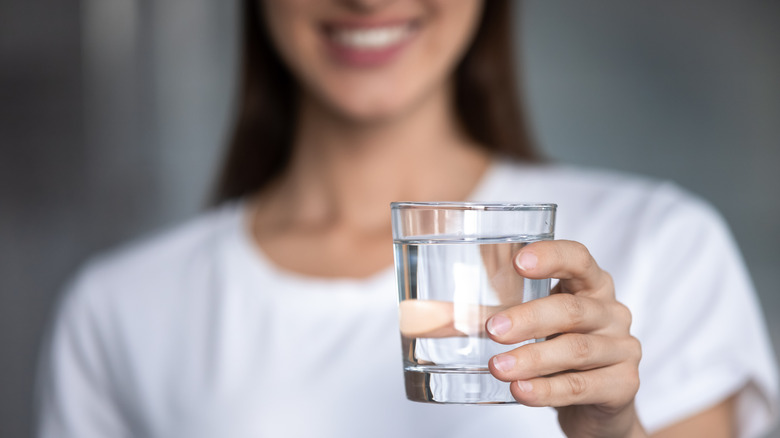Should You Really Be Drinking A Gallon Of Water A Day?
We all know that we should be drinking more water every day. We have to keep our organs functioning and our bodies working properly. Without drinking the right amount of water, our bodies will start to show dehydration issues. According to the Centers for Disease Control and Prevention, water is essential for lubricating your joints and keeping your normal body temperature. With so much depending on your hydration, how much water is necessary to keep your body healthy?
Because drinking water is so important, many have their own opinion about how much you should be drinking. Many challenges have started popping up to encourage people to start drinking different amounts of water to see the total benefits. One of the most popular challenges is the water gallon challenge. This involves drinking a gallon of water every day to see your body truly change thanks to the increased water intake. However, some critics are saying that this amount of water is unnecessary and could even be bad for you.
At the end of the day, water is truly vital for our existence and we need to be more aware of our intake.
Is drinking a gallon good or bad for you?
With so many talking about the gallon challenge, it begs the question of whether this is truly the solution to optimal living.
According to dietician Beth Czerwony, RD, who explains to the Cleveland Clinic, "Drinking a gallon of water a day is not necessary, but it's not going to hurt you either. Everybody's hydration levels are different, but most people don't need a daily gallon." Czerwony states that there is no magic number for how much water you should be taking. Everyone's hydration level will truly vary depending on the individual, meaning that a gallon of water a day may or may not work for you.
However, drinking too much water can also be dangerous if your body doesn't need it. Kelly Ann Hyndham, assistant professor of cardio-renal physiology and medicine at the University of Alabama, tells Good Housekeeping, "If you have a disease like chronic kidney disease or congestive heart failure, drinking too much water may lead to very low plasma sodium levels. That can lead to all sorts of problems, which may manifest as headaches, seizures, brain swelling, and in some cases, death." However, Hyndham also continues to explain that there is an equal amount of risk if you remain dehydrated.
So, at the end of the day, drinking a gallon a day is not necessary, but the idea of staying hydrated isn't a bad idea. The amount of water you need will depend on your body and how much it needs.
How water can truly make a difference
Now that you know you don't need to drink a gallon a day, it's important to acknowledge why you need to be drinking water in the first place.
The National Council on Aging explains that even the smallest amount of dehydration can cause big problems. The NCOA states that just 2% fluid loss, or mild dehydration, can result in changes in memory, mood, concentration, and reaction time. As well, dehydration can lead to irregular bowel movements and other digestive issues. Water is an essential element to keep your digestive system moving and functioning at a normal rate.
One of the most controversial takes concerning water is how it can help with weight loss. According to Healthline, water can help with weight loss in multiple ways. Besides helping flush out your digestive system, water can potentially make you feel full faster meaning you can eat less or the amount you need. As well, drinking enough water can help boost your metabolism rate or even burn calories a bit quicker. When you are dehydrated, your body is not working at this speed, making it harder to maintain a healthy weight.


